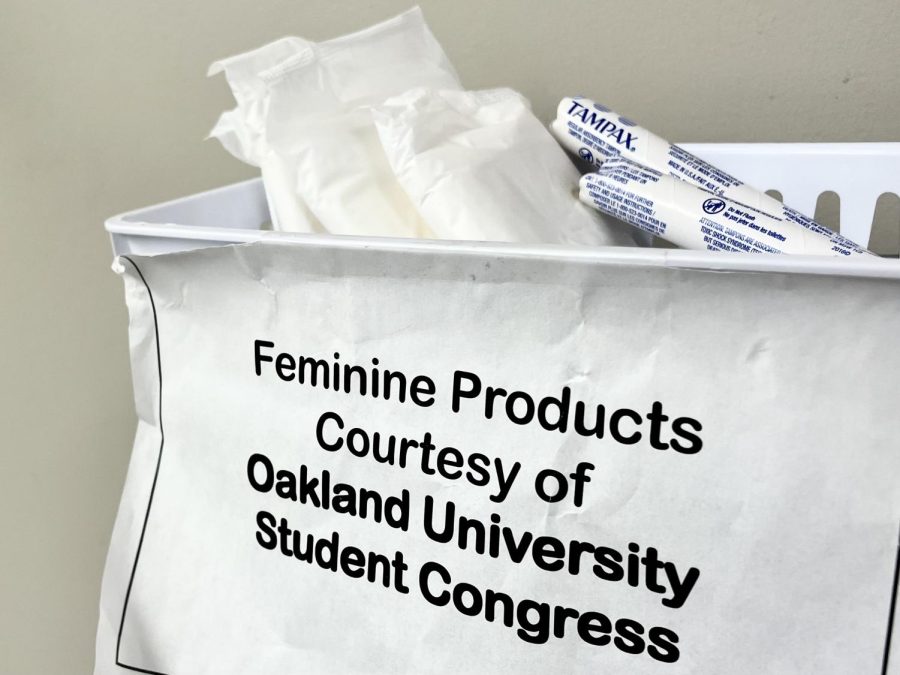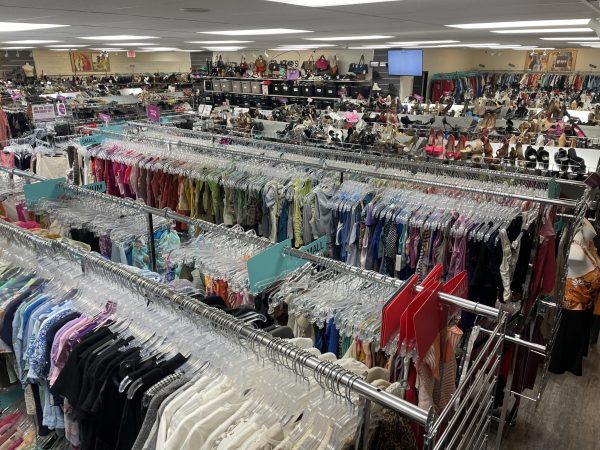OUSC, administration reach agreement for menstrual product distribution
Student Congress has partnered with other student leaders and administrators in Student Affairs to get free period products in bathrooms around campus.
After prolonged discussion between Oakland University Student Council (OUSC) and Oakland University administration, an agreement has been reached to distribute free menstrual products on campus.
The menstrual products will be available in housing buildings and products already available in the Oakland Center will have new dispensers. Additionally, there are plans to install dispensers in high traffic academic buildings in the fall.
These buildings include the Kresge Library, Pawley Hall, Elliott Hall and the Human Health Building.
OUSC President Andrew Romano and Vice President Murryum Farooqi both cite Senior Vice President for Student Affairs & Chief Diversity Officer Glenn Macintosh as the primary reason why this initiative has been successful.
“VP Macintosh was able to help us get the ball rolling in terms of getting dispensers in the Oakland Center, getting products in the housing desks, as well as installing dispensers in a few high traffic buildings,” Farooqi said. “He was empathetic to the cause and definitely brought our spirits up when we were talking about the various things we wanted. His overall response was that a lot of the things we wanted — like products at housing desks, in the OC bathrooms in dispensers and dispensers in buildings — were all things that were very doable — which was kind of a shock to us after having spoken to other people in administration that pretty much told us the complete opposite.”
Without the assistance from Macintosh, there was fear from OUSC that distribution would never occur. OUSC has struggled to get approval for this initiative for some time. Romano said that he was surprised by the pushback he received from housing and maintenance faculty.
According to Farooqi, Housing Recruitment Manager Jenn Bonardelli told OUSC that providing free menstrual products was not a possibility because university housing is not permitted to distribute bandaids, pain medication, over-the-counter products or any other health-related products.
“[The] argument from housing [was] that they aren’t allowed to distribute medical related products,” Farooqi said. ‘Tampons and pads are somehow medical but toilet paper is a-okay.”
Both Romano and Farooqi also had regular contact with Director of Facility Services, Douglas LaLone who relayed to them that he needed a guarantee that OUSC would be able to permanently provide the products and also be willing to refill the dispensers on campus.
“[LaLone said] he [would] bring [the matter] to the Vice President of facilities to determine all of the stakeholders involved,” Farooqi said. “LaLone also said that they also need to check with the legal department to see if there are any legal liability issues providing these items.”
“[It was] very confusing for us because we already do it in [the OC],” Romano said. “The weirdest part about this whole thing is they used to sell [menstrual products] in the bathrooms two years ago, so giving them out for free should not be a legal liability.”
LaLone told The Oakland Post that he has not spoken to the legal department because they did not respond to his original request.
“When OUSC first did this back in 2017 it took a week for them to get approval to do it in the OC and that was that,” Romano said. “We didn’t think we would have all of these controversies, especially since we have shown that we can do it— we’ve done it for five years now [in the OC]. We didn’t think it would be so controversial to do it in more buildings.”
After much debate with university administrators, the OUSC have managed to overcome various obstacles through partnership in order to accomplish the shared mission of supporting OU students by providing increased access to menstrual products.











Ann Galen • Apr 13, 2022 at 5:41 PM
I think it is great to have these products and dispensors all over the OU campus.
However, shouldn’t the cost of installing and supplying feminine products be paid for by a surcharge on the tuition of female students?
I think the male student tuition should be lowered so as male students will not have to pay for this.
Not Exactly • Apr 13, 2022 at 10:45 PM
OU gives out free condoms but men aren’t charged additional, OU gives out free covid tests but those who test positive don’t have to pay additional tuition, and we provide free masks but those who take them don’t get charged extra. do those who use the RecCenter get charged an additional fee???? The reason it makes sense to supply these items and more is because its of the best interest of the entire public to keep everyone healthy. It would be absurd to say because we have to make buildings handicap friendly, handicap students need to pay more in tuition. I know you mean no harm with your comment; but, it’s important to treat all matters of normal bodily functions and public health as in the best interest of everyone, not just those who directly experience it.
Yousef • Apr 13, 2022 at 9:17 AM
why are we paying for pads and tampons? If it is because women need them then by that same logic why dont we also pay for every hygienic product?
Ummm • Apr 13, 2022 at 12:43 PM
Because if a menstruater doesn’t have access to a pad or tampon your only other option is to sit in a pool of your own blood.
Yousef • Apr 13, 2022 at 3:35 PM
Why cant women just…buy it?
Anonymous • Apr 13, 2022 at 1:57 PM
They do. You have free hand soap in the restrooms, free hand sanitizer in various locations, and free shampoo/shower gel in the OU Rec showers. Clean is good, and being without menstrual supplies when needed is not a pleasant place to be.
Anonymous • Apr 14, 2022 at 10:26 AM
We should also provide students with other hygienic products. Low income students are disproportionately effected by the cost of hygiene products and its in the best interest of the student body that everyone have access to health items. Free menstrual products is a great step forward.